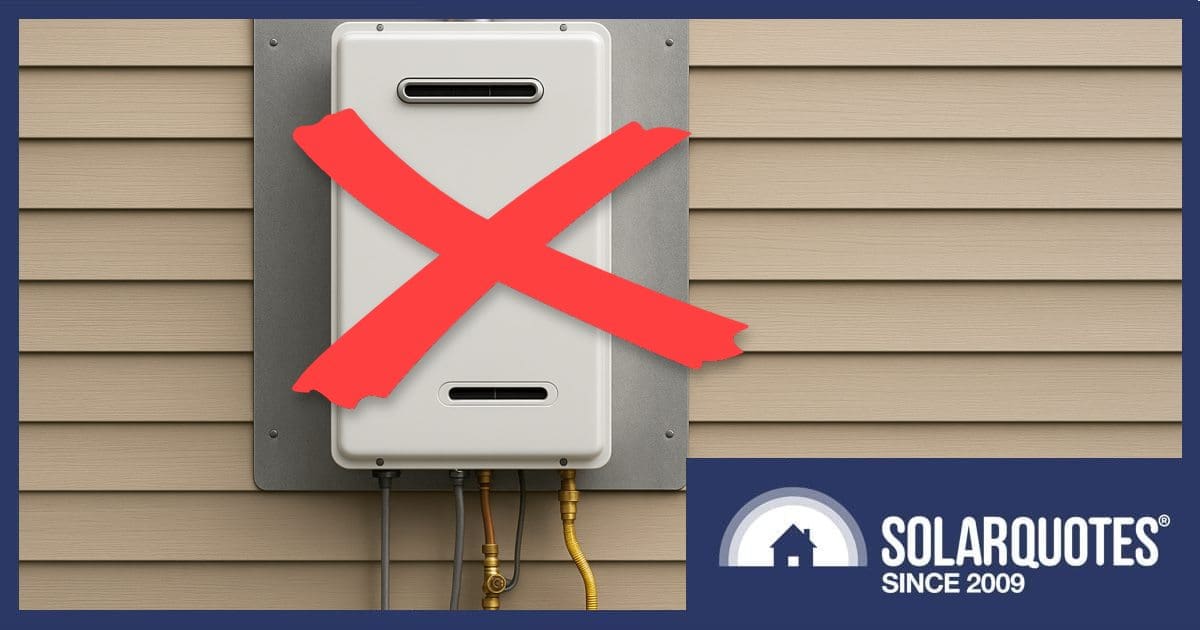
As the Victorian Government pursues increasing residential electrification in the state, home owners and landlords will be getting a firm push in that direction under changes to come into effect in 2027. But the reforms aren’t as broad as they could have been.
Following consultation on draft regulations for Victoria’s Building Electrification Regulatory Impact Statement, Premier Jacinta Allan and Minister for Energy and Resources Lily D’Ambrosio yesterday announced reforms to support the state’s goal of reducing residential gas consumption.
Owner/Occupier Homes And Commercial Buildings
From January 1, 2027, *all* new homes1 and all new commercial premises besides industrial, manufacturing and agricultural buildings will need be built all- electric.
And under new regulations to take effect from 1 March 2027, when a gas hot water system in an existing home reaches the end of its service life (not just needing a repair), it must be replaced with an efficient electric alternative such as a heat pump hot water system.
To support the switch, rebates are available from the Victorian Energy Upgrades (up to $490) and Solar Victoria programs (up to $1,000 + an extra $400 for an eligible ‘Australian-made” system).
There are no changes yet to gas heating for owner occupiers or gas cooking in existing homes. While including replacing end-of-life gas heaters with efficient electric appliances (e.g. a reverse cycle air-conditioner) was the Victorian Government’s preferred option, that didn’t make the final cut.
Rental Properties
From 1 March 2027, new Minimum Energy Efficiency Standards will apply to rental properties and public housing in Victoria. From that date:
- Gas hot water systems must be replaced with efficient heat pumps at the end of their service life.
- Gas heaters must be replaced with reverse-cycle air conditioners at end of service life.
And at the start of a new lease after 1 March 2027:
- Main living areas (which are already required to have heating) must also have an efficient electric cooling system — a reverse cycle air-conditioner will satisfy this and the above gas heater requirement.
- A minimum 4-star WELS rated shower head must be installed.
- Where ceiling insulation isn’t present, minimum R5.0 rating insulation must be installed.
- Draught sealing must be installed.
In rental homes with none of the above, landlords could be forking out a significant amount of cash to get their properties ship-shape; but will also be supported by Victorian Energy Upgrades and Solar Victoria rebates. There may be some exemptions such as where installation costs are prohibitive or there are space issues.
To support local appliance manufacturing, the Allan Government will also be investing $9.5 million towards an Industry Diversification Program.
Rewiring Australia: Changes “Vital”
Rewiring Australia said the standards are nation-leading and strongly recommended other states follow suit.
“By requiring landlords to electrify their investment properties when gas appliances need to be replaced, Victoria’s new standards will crucially reduce energy bills for renters,” said Rewiring Australia CEO Francis Vierboom. “This is vital because renters have little choice in how their home is powered and cannot as easily benefit from cheaper electric alternatives as homeowners.”
IEEFA: “A Positive Step”
The Institute for Energy Economics and Financial Analysis (IEEFA) also welcomed the announcement.
“These regulations are good news for industry as well as households,” said IEEFA Analyst Jay Gordon. “Victoria is grappling with the risk of gas supply shortfalls. But by transitioning homes to efficient electric appliances that are cheaper to run, that gas can be freed up for industrial users who might not yet have the option to electrify.”
… and just on that note; the Allan Government’s Gas Security Statement was also released yesterday, outlining the steps being taken to avoid gas shortfalls previously forecast by the Australian Energy Market Operator (AEMO).
Whether you’re in Victoria or another state or territory, discover how getting off gas saves you money (and how much).
Footnotes
- All new homes and apartment buildings that require a planning permit have been required to be all-electric since the beginning of 2024. ↩

 RSS - Posts
RSS - Posts



The grid is already struggling. Where the solution for for reliable electricity? It shows the government has no clue
Indeed, what will keep the ‘lights on’ in the years/decades to come?
• Not from coal – 60% of the currently operating coal-fired generator units in the NEM are 40 years or older, and they won’t be operating by 2035;
https://www.climatecouncil.org.au/resources/new-research-reveals-our-ageing-coal-fleet-is-unreliable-and-risks-energy-security/
• Not from gas – the Australian east coast gas 2P reserves-to-production is less than 17 years – see the AEMO’s Gas Statement of Opportunities – March 2025, Figure 27. Gas will only get scarcer & more expensive;
• Not from nuclear – any operating nuclear power generator unit is 20+ years away in Australia AFTER the nuclear bans are repealed! See my Submission (#066) to the Australian Parliament House of Representatives Select Committee on Nuclear Energy.
I think people need to be made aware of their ‘energy blindness’!
Nothing happens without energy…
There is no doubt that reverse cycle is more energy efficient than other forms of heating or cooling, (and induction stoves are also more efficient), but a change away from gas for those immediate heating purposes adds an additional load on the grid at a time when electricity is already at premium demand and prices.
Will sufficient batteries be installed at the same rate as uninstalling gas to help to spread the current demand spike increase, or will it cause even higher grid prices during the evening peak during winter?